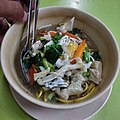Mee rebus: Difference between revisions
CSV import Tags: mobile edit mobile web edit |
CSV import |
||
| Line 22: | Line 22: | ||
{{stub}} | {{stub}} | ||
<gallery> | |||
File:Mee_Rebus_by_Banej,_Singapore_October_2017.jpg|Mee Rebus by Banej, Singapore October 2017 | |||
File:Mie_Rebus_Jawa.jpg|Mie Rebus Jawa | |||
File:Mie_rebus_Medan1.jpg|Mie Rebus Medan | |||
File:Mee_rebus.JPG|Mee Rebus | |||
File:MeeRebus.JPG|Mee Rebus | |||
File:Mee_rebus_and_Bandung_drink.jpg|Mee Rebus and Bandung drink | |||
File:Mi_rebus_Kuala_Terengganu.jpg|Mi Rebus Kuala Terengganu | |||
</gallery> | |||
Latest revision as of 21:29, 20 February 2025
Mee Rebus is a popular noodle dish from the Malay culinary tradition. It is also commonly found in Indonesia, Malaysia, and Singapore. The dish is made with yellow egg noodles, which are also known as Hokkien noodles, served with a thick, spicy, slightly sweet gravy. The gravy is made from sweet potatoes, which gives it its unique taste and consistency. The dish is usually garnished with a hard-boiled egg, lime wedges, spring onions, Chinese celery, green chillies, fried shallots, bean sprouts, and fried tofu.
Etymology[edit]
The term "Mee Rebus" is derived from the Malay language, where "mee" means noodles and "rebus" means boiled. Hence, the term "Mee Rebus" literally translates to "boiled noodles".
Ingredients and Preparation[edit]
The main ingredients of Mee Rebus are yellow egg noodles, sweet potatoes, and a variety of garnishes. The gravy is made by boiling sweet potatoes until they are soft and then mashing them. Other ingredients such as lemongrass, galangal, and garlic are then added to the mashed sweet potatoes and the mixture is simmered until it thickens. The noodles are then boiled separately and served with the gravy and garnishes.
Variations[edit]
There are several variations of Mee Rebus in different regions. In Indonesia, the dish is often served with a side of sambal. In Malaysia, the dish is sometimes served with a side of satay. In Singapore, the dish is often served with a slice of green lime to give it a tangy taste.









